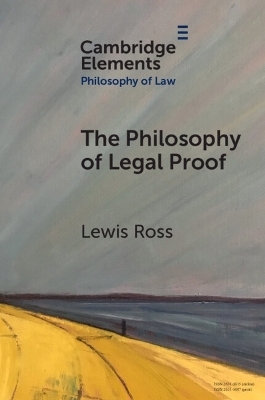
The Philosophy of Legal Proof
Seiten
2024
Cambridge University Press (Verlag)
978-1-009-12504-8 (ISBN)
Cambridge University Press (Verlag)
978-1-009-12504-8 (ISBN)
This Element introduces the standards of proof and considers what justifies them, discusses whether we should use different standards in different cases, asks whether trials should end only in binary outcomes or use more precise verdicts, considers whether proof is simply about probability, and examines who should be trusted with deciding trials.
Criminal courts make decisions that can remove the liberty and even life of those accused. Civil trials can cause the bankruptcy of companies employing thousands of people, asylum seekers being deported, or children being placed into state care. Selecting the right standards when deciding legal cases is of utmost importance in giving those affected a fair deal. This Element is an introduction to the philosophy of legal proof. It is organised around five questions. First, it introduces the standards of proof and considers what justifies them. Second, it discusses whether we should use different standards in different cases. Third, it asks whether trials should end only in binary outcomes or use more fine-grained or precise verdicts. Fourth, it considers whether proof is simply about probability, concentrating on the famous 'Proof Paradox'. Finally, it examines who should be trusted with deciding trials, focusing on the jury system.
Criminal courts make decisions that can remove the liberty and even life of those accused. Civil trials can cause the bankruptcy of companies employing thousands of people, asylum seekers being deported, or children being placed into state care. Selecting the right standards when deciding legal cases is of utmost importance in giving those affected a fair deal. This Element is an introduction to the philosophy of legal proof. It is organised around five questions. First, it introduces the standards of proof and considers what justifies them. Second, it discusses whether we should use different standards in different cases. Third, it asks whether trials should end only in binary outcomes or use more fine-grained or precise verdicts. Fourth, it considers whether proof is simply about probability, concentrating on the famous 'Proof Paradox'. Finally, it examines who should be trusted with deciding trials, focusing on the jury system.
Introduction; 1. Standards of proof; 2. Proof: Fixed or flexible?; 3. Should proof be binary?; 4. Legal probabilism and anti-probabilism; 5. Who should decide?; References.
| Erscheinungsdatum | 04.05.2024 |
|---|---|
| Reihe/Serie | Elements in Philosophy of Law |
| Zusatzinfo | Worked examples or Exercises |
| Verlagsort | Cambridge |
| Sprache | englisch |
| Themenwelt | Recht / Steuern ► Allgemeines / Lexika |
| Recht / Steuern ► EU / Internationales Recht | |
| Recht / Steuern ► Privatrecht / Bürgerliches Recht ► Berufs-/Gebührenrecht | |
| ISBN-10 | 1-009-12504-4 / 1009125044 |
| ISBN-13 | 978-1-009-12504-8 / 9781009125048 |
| Zustand | Neuware |
| Informationen gemäß Produktsicherheitsverordnung (GPSR) | |
| Haben Sie eine Frage zum Produkt? |
Mehr entdecken
aus dem Bereich
aus dem Bereich
mit Gerichtskostengesetz, Gesetz über Gerichtskosten in …
Buch | Softcover (2024)
dtv Verlagsgesellschaft
CHF 22,25
Muster und Erläuterungen zum Gerichts- und Notarkostengesetz (GNotKG)
Buch | Softcover (2024)
C.H.Beck (Verlag)
CHF 62,95


